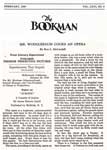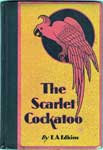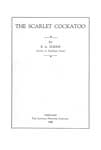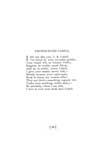One of the more fun features of the journal Kalki: Studies in James Branch Cabell was the column called "Trifles Found by Moonlight." this was essentially a "Hmmm, look what I found column" where readers reported references to Cabell found in unusual places, entertaining bits of Cabell-related trivia, poems, anecdotes, and... what-have-you. Both because we enjoyed Trifles so much and because you can make almost anything fit into it, we have revived it here on The Silver Stallion.
If you have something tht you think would fit in here, please send it to us at editor@silverstallion.karkeeweb.com. You'll be immortalized with an acknowledgement on this page, and added to the Contributors' Roll of Honor.
A scanned reprint of “Mr Wogglebaum Cooks An Opera” by Roy L McCardell, from the The Bookman, Vol. LXVI, No. 6, for February, 1928. The piece is a grotesque parody of a report to a fictional movie studio on the potential of Jurgen to be transformed into a blockbuster starring Lon Chaney as the “Half-horse Man”. And by the way, don't worry if you're not up on 1920s Hollywood slang - there's a glossary at the end of the piece! This was reprinted in Kalki Vol.IV, No.3 (#15) 1970, on pp. 78, 111. The scan shown here, though, is from the original 1928 article in The Bookman. Click on the thumbnail to access the PDF. You'll need to use your browser's back button to return to The Silver Stallion after viewing it.
Barrett H. Clark is known to Cabellians as the editor of the volume Jurgen and the Censor, in which he marshaled the forces of contemporary writers in defense of Jurgen during its suppression. He was also an editor and playwright, and in his 1951 memoir Intimate Portraits; Being Recollections of Maxim Gorky, John Galsworthy, Edward Sheldon, George Moore, Sidney Howard & others he gives an account (pp. 185-91) of how he and Sidney Howard (winner of the 1925 Pulitzer Prize for Drama for They Knew What They Wanted. and the 1939 Academy Award for the screenplay of Gone with the Wind) worked together in 1919-20 to turn Cabell's The Rivet in Grandfather's Neck into a stage play. After completing a draft they were afraid to send it to Cabell for fear he would be angry at the changes they had made. But they sent it, and received from Cabell "a gracious and courtly letter." He was still, he wrote, 'in a whirlwind of amazement and admiration over this miracle you and Mr. Howard have wrought. The thing is certainly a play, and to my partial judgement a very good play; and there was certainly no play in the novel.' He did, nonetheless, wonder why we had done this or that, and added, 'I was a bit taken aback by the talk between Charteris and Musgrave in the last act, which in the book hinges almost entirely on the fact that both men know Patricia is listening... [that] was robbed of its pivot; and further aback when I saw it seemed to move quite as well without this factor... Trifles, these, of course; what matters is your clever combination of Anne-Clarice, and your development of Virginia and Agatha.'"
The script was completed, but there was difficulty in finding a producer, and the project was shelved. In 1926-7 it was revived and revised by Clark alone, and eventually staged briefly under the title "The House of Musgrave". Shortly after abandoning Rivet, Howard completed his first professionally-staged play, Swords (1921), a medieval costume drama. In the acknowledgments to the published text, Howard says The author gratefully acknowledges his indebtedness to certain modern masters of medieval life for the inspiration and instruction their books have afforded him. Particularly he would name Henry Osborn Taylor's "The Medieval Mind", Henry Adams' "Mont St Michel and Chartres", and the two revivers of medieval romance, James Branch Cabell and Joseph Bedier.
I recently acquired a copy of the 1928 Bodley Head edition of Carl Van Doren's James Branch Cabell only to find a manuscript poem pasted onto the front free endpaper: The poem plays with Cabell's well-known complaint that folks would not pronounce his name correctly, which led him to create the mnemonic "Tell the rabble my name is Cabell."
Pronounced Cabell
I do not like you, J. B. Cabell.
I'm bored by your recondite gabble,
Your risque wit, so frankly Gallic,
Suggests an erudite smart Aleck,
And so in public, James Cabell,
I give your stories merry hell--
Mainly because your equivoques
Seem to annoy my women folks!
They say there's something vaguely vile
About your mocking subtle style--
So privately, when I am able,
I love to read your stuff, dear Cabell.
My book bears the bookplate of the New Zealand writer Guy N. Morris (1886-1949), who is remembered primarily as a scholar of Katherine Mansfield, though he is known to have collected Cabelliana, and to have worked on a book on Cabell's friend and protege Frances Newman, though he did not live to complete it. I wondered-- did Morris write this verse?
Google suggests he did not. It was quoted in Alfred Hubbard Holt's Wild Names I Have Met (1932) which cites the Chicago Tribune as its source. So the verse must date from between c1920, when Cabell's "mocking subtle style" became famous, and 1932. It seems unlikely that Morris wrote humorous verse for the Chicago papers at this (or any other) time. Some Chicago wag is probably the culprit -- Ben Abramson? Ben Hecht? Anyone have more information?
...We've found the author! This poem is by E. A. Edkins and appears in his volume of verse titled The Scarlet Cockatoo (Chicago, 1928). Ernest Arthur Edkins (1867-1946) was a Chicago-based writer who is perhaps best remembered for being a friend and correspondent of H. P. Lovecraft.
Textual Note: The poem's tenth line as given in Holt is "Under your mocking subtle style," and the discovery of Edkins' original confirms that 'under' is the correct reading.



